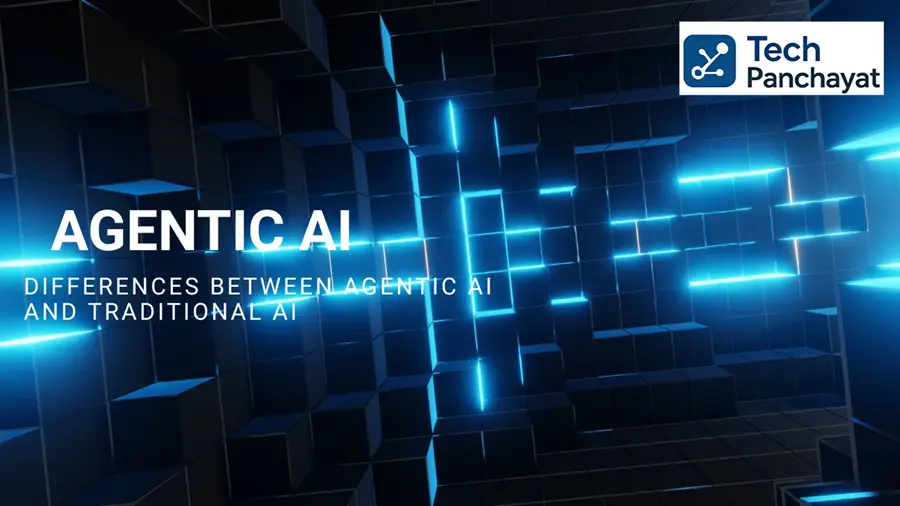Artificial Intelligence (AI) has experienced unprecedented growth in recent years, rapidly evolving from a niche research field into a cornerstone technology powering innovations across virtually every industry. From personalized recommendation systems that shape our digital experiences, to image recognition tools used in security and medical diagnostics, and speech-to-text models that make voice assistants smarter traditional AI has already transformed the way we live, work, and interact with the world. Yet, even as these familiar applications become increasingly sophisticated, a new and exciting frontier is emerging within the realm of AI: Agentic AI.
Agentic AI represents a fundamental shift in how we conceptualize artificial intelligence. Unlike traditional models that operate passivelyprocessing inputs and returning outputs Agentic AI systems are designed to act autonomously, set goals, make decisions, and even interact dynamically with their environment in pursuit of those goals. These AI agents are not just tools; they are closer to collaborators, capable of reasoning, planning, adapting, and learning over time.
In this in-depth article, brought to you by TechPanchayat, we will delve into the world of Agentic AI to understand:
What Is Agentic AI?
Agentic AI refers to a new generation of artificial intelligence systems designed to operate with a high degree of autonomy in complex, real-world environments. Unlike traditional AI models, which excel at narrowly defined tasks such as image recognition, language translation, or recommendation algorithms. Agentic AI systems possess the ability to make decisions independently, set their own goals, and carry out actions that closely mimic the decision-making processes of human agents.
The term “agentic” is derived from “agency,” which in philosophy and psychology describes an entity’s capacity to act independently, make purposeful choices, and influence its surroundings. In this context, Agentic AI systems are not mere passive tools responding to inputs; they are proactive agents that engage with their environment, continually assess situations, and adapt their strategies to meet evolving objectives.
Core Characteristics of Agentic AI
Autonomy
Agentic AI operates without constant human supervision. It can assess a situation, make decisions based on available information, and perform complex sequences of actions to accomplish a goal. This level of autonomy goes beyond simple automation or rule-based systems.
Goal-Oriented Behavior
Unlike conventional AI that performs predefined tasks, Agentic AI is designed to pursue goals. It can plan steps, assess progress, and adjust its approach to achieve desired outcomes, even in unpredictable or changing environments.
Adaptability
Agentic AI adapts to new or unexpected scenarios. Traditional AI models often struggle when faced with data that differs from their training set, but agentic systems can learn from experience and adjust their actions accordingly.
Self-Improvement
Some Agentic AI models have the ability to refine their algorithms based on outcomes and feedback. They can improve their decision-making processes over time, leading to better performance without requiring explicit reprogramming.
Complex Interaction
These systems are capable of complex interactions with the external environment. They don’t just respond to simple inputs but analyze situations, evaluate risks, predict consequences, and interact with other agents or humans in a meaningful way.
Traditional AI Models: A Brief Overview
Rule-Based Systems
Early AI systems operated on a strict set of rules predefined by humans. These systems lacked flexibility and could only handle situations anticipated by their developers.
Machine Learning Models
Machine Learning (ML) enabled AI to learn patterns from data and improve performance over time. Examples include spam email detection, image classification, and speech recognition. However, these ML models typically perform narrow tasks and require large labeled datasets for training. They are not designed to make complex decisions or achieve long-term goals.
Deep Learning Systems
Deep Learning has advanced AI capabilities, particularly in tasks like image recognition, natural language processing (NLP), and autonomous driving. Still, most deep learning models lack agency they do not autonomously decide goals or adapt strategies.
Agentic AI vs Traditional AI Models: Key Differences
| Feature | Agentic AI | Traditional AI Models |
|---|---|---|
| Autonomy | Fully autonomous, able to plan and execute complex tasks | Limited autonomy, performs predefined tasks based on input data |
| Goal Setting | Can set and pursue long-term goals independently | No goal-setting; only executes predefined objectives |
| Adaptability | Learns and adapts in real-time to new environments | Depends on training data; poor at handling unseen scenarios |
| Interaction | Engages in complex interactions with environment and other agents | Mostly limited to input-output responses |
| Self-Improvement | Capable of improving decision-making processes through feedback | Relies on human-driven retraining for improvements |
| Complex Decision Making | Able to evaluate multiple variables, predict outcomes, and take decisions | Limited decision-making based on learned patterns or rules |
Real-World Applications of Agentic AI
Autonomous Vehicles
Self-driving cars are a prime example of Agentic AI in action. These vehicles must analyze the environment, make real-time decisions (e.g., when to change lanes), and adapt to unexpected obstacles without human intervention.
Robotics
Advanced robots in manufacturing or logistics can autonomously navigate complex warehouses, pick and place items, and optimize routes in real-time without human control.
Virtual Personal Assistants
Next-generation virtual assistants are being designed to go beyond basic commands. Instead of simply responding to queries, Agentic AI-powered assistants can manage schedules, coordinate meetings, and even make purchasing decisions based on user preferences.
Healthcare
Agentic AI systems can autonomously monitor patients, predict deteriorating health conditions, recommend interventions, and adjust care plans without requiring constant input from healthcare professionals.
Finance
In the financial sector, Agentic AI models can autonomously analyze market trends, execute trades, and rebalance investment portfolios to achieve optimal returns based on long-term goals.
Challenges Facing Agentic AI
Ethical Concerns
With increased autonomy, ethical questions arise. How do we ensure that Agentic AI systems make morally sound decisions? How can we prevent harmful behavior in unpredictable scenarios?
Transparency and Explainability
Agentic systems are often complex and opaque, making it difficult to understand why a particular decision was made. This lack of transparency poses a challenge in critical fields like healthcare and finance.
Safety and Reliability
An Agentic AI must be thoroughly tested to ensure its decisions don’t cause harm. Designing reliable fallback mechanisms in case of system failure is crucial.
Regulation and Accountability
Who is responsible if an Agentic AI system makes a mistake? Regulatory frameworks are still developing, and holding AI systems or their creators accountable is a complex issue.
The Future of Agentic AI
As technology progresses, the distinction between Agentic AI and traditional AI models will become more significant. Researchers are working on integrating advanced reinforcement learning techniques, hierarchical decision-making frameworks, and ethical constraint algorithms to build safe, autonomous agents.
Some experts believe that Agentic AI will be a crucial step toward Artificial General Intelligence (AGI),systems that possess human-level cognitive capabilities. While AGI remains theoretical at this point, Agentic AI serves as a practical stepping stone.
Conclusion
Agentic AI marks a revolutionary advancement in the field of artificial intelligence. Unlike traditional AI models, which perform narrowly defined tasks, Agentic AI possesses autonomy, adaptability, goal-oriented behavior, and the ability to interact meaningfully with complex environments.
As industries continue to adopt this technology, from autonomous vehicles to advanced virtual assistants, the potential for efficiency and innovation grows. However, ethical considerations, transparency challenges, and the need for regulatory oversight remain critical for the responsible development of Agentic AI.
In the near future, as Agentic AI matures, it will play an increasingly significant role in automating decision-making processes, enhancing human capabilities, and transforming the way we interact with machines. Stay updated with the latest insights and technology trends on TechPanchayat.




